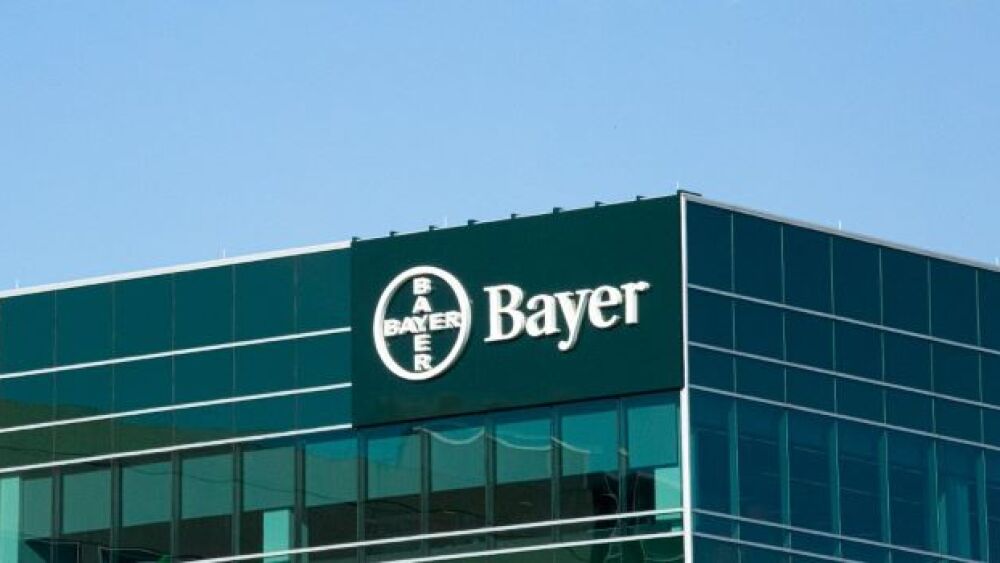Bayer is heading back to the FDA to seek approval for a new indication of its prostate cancer drug Nubeqa, following positive Phase III results.
Kena Betancur/VIEWpress/Corbis via Getty
Bayer is heading back to the U.S. Food and Drug Administration to seek approval for a new indication for its prostate cancer drug Nubeqa, following positive Phase III results that showed a statistically significant increase in overall survival and reduction in the risk of death.
In the Phase III ARASENS study, Nubeqa (darolutamide) combined with androgen deprivation therapy (ADT) and the chemotherapy drug docetaxel hit the mark in improving survivability for patients with metastatic hormone-sensitive prostate cancer (mHSPC). Data from the study showed the risk of death was reduced by 32.5% compared to ADT plus docetaxel in this patient population. According to Bayer, at the time of cut-off, the median treatment duration was 41 months for the Nubeqa treatment arm than for ADT and docetaxel alone, which had a 16.7-month duration.
Additionally, Bayer said the Nubeqa combination also showed a statistically significant benefit across multiple secondary endpoints. Those secondary marks include delay in time to castration-resistant prostate cancer (CRPC), time to pain progression, time to first symptomatic skeletal event (SSE), and initiation of subsequent systemic antineoplastic therapy.
Histoircal Data of Nubeqa
Nubeqa previously won approval for treating patients with non-metastatic castration-resistant prostate cancer (nmCRPC). Now, Bayer is taking the new study data published in The New England Journal of Medicine and presented at the 2022 ASCO GU Cancers Symposium to the FDA and other regulatory agencies to expand its label.
Robert LaCaze, head of the Oncology SBU at Bayer and member of the executive committee of Bayer’s Pharmaceutical Division, said the data from the ARASENS study in mHSPC complements the existing Phase III ARAMIS data in nmCRPC. Nubeqa has shown significant promise for patients across these key disease stages in prostate cancer with both studies.
“We believe Nubeqa has the potential to become a foundational drug for appropriate prostate cancer patients. We are committed to making this potential new treatment option in mHSPC available to patients and their treating physicians, and therefore are pursuing the fastest possible regulatory timelines,” LaCaze said in a statement.
Nubeqa is an androgen receptor inhibitor (ARi) that Bayer and Finland-based Orion Corporation jointly developed. It is designed to inhibit androgen binding, AR nuclear translocation, and AR-mediated transcription competitively. It binds to the androgen receptor on the prostate cells to block testosterone from connecting, which delays cancer growth.
Prostate cancer is the second most common cancer in men worldwide, with about 164,000 expected diagnoses in the United States this year. It is estimated that more than 40,000 men in the U.S. are living with mCSPC, a form of prostate cancer that has spread to other parts of the body and still responds to a medical or surgical treatment that lowers testosterone. Men are considered hormone (or castration) sensitive if their disease responds to medical or surgical treatment to lower testosterone levels. The survival rate for this disease is relatively low, with an average 30% five-year survival rate.
Matthew Smith, M.D., Ph.D., director of the Genitourinary Malignancies Program at the Massachusetts General Hospital Cancer Center, pointed to the devastating diagnosis of metastatic prostate cancer. He said the addition of Nubeqa to the standard-of-care treatment of ADT and chemotherapy has significantly increased overall survival for the patients. Smith added that Nubeqa improved castration-resistant prostate cancer and other critical secondary endpoints.
“These results are an important step forward for the treatment of patients with metastatic hormone-sensitive prostate cancer,” Smith said in a statement.
With Nubeqa, Bayer is taking a solid position in the prostate cancer sector that includes treatments such as Pfizer’s Xtandi, which won approval for non-metastatic Castration-Resistant Prostate Cancer in 2018. The Pfizer drug was initially approved in 2012 for late-stage prostate cancer. Nubeqa is also challenging Johnson & Johnson’s Erleada, which won approval in 2018 for non-metastatic castration-resistant prostate cancer.
Bayer is also assessing Nubeqa across various stages of prostate cancer. Among those studies are a Phase III trial in metastatic hormone-sensitive prostate cancer (mHSPC) and a Phase III trial evaluating Nubeqa as an adjuvant treatment for localized prostate cancer with a very high risk of recurrence.





